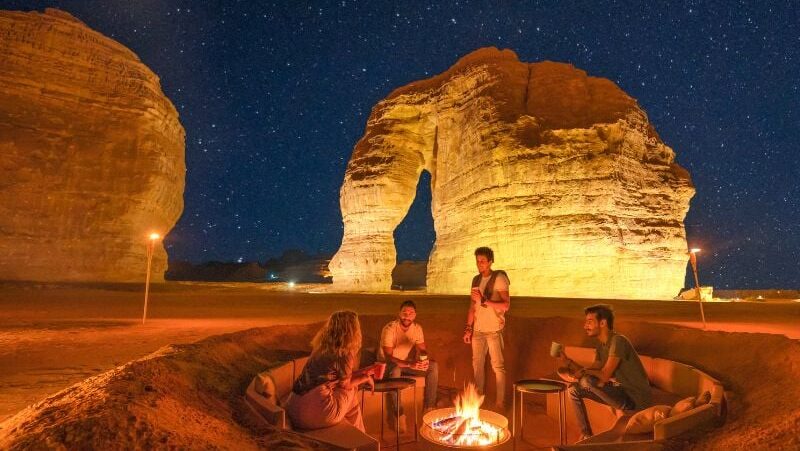Saudi Arabia’s Night Skies: A Stargazer’s Dream Destination
Saudi Arabia’s vast deserts and clear skies offer some of the most breathtaking stargazing experiences in the world. The country’s commitment to preserving its natural nightscapes has led to the establishment of Dark Sky Parks, making it a prime destination for astronomy enthusiasts and casual observers alike. With minimal light pollution, vast open landscapes, and unique geological formations, the kingdom provides an exceptional view of celestial wonders, attracting visitors from all around the globe.
AlUla: The Heart of Saudi Stargazing
One of the most iconic locations for stargazing in Saudi Arabia is AlUla, an ancient region rich in history and natural beauty. In 2024, AlUla Manara and AlGharameel Nature Reserves were officially designated as International Dark Sky Parks by DarkSky International. This recognition highlights the region’s dedication to minimizing light pollution and preserving the natural darkness of its night skies.
Visitors to AlUla can experience the Milky Way in all its glory, framed by unique rock formations and untouched desert landscapes. The area’s vast open spaces, combined with its historical and cultural significance, make it an ideal location for both amateur and professional astronomers. Guided tours often include educational sessions on the stars, constellations, and planetary movements, providing a deeper appreciation of the universe.
Gharameel: A Celestial Experience
One of the standout stargazing spots in AlUla is Gharameel. Known for its mystical rock formations, Gharameel offers an unparalleled view of the night sky, free from urban light interference. The unique jagged rock pillars create an otherworldly atmosphere, making it a perfect backdrop for astronomical observations and night photography.
Guided tours to Gharameel often include expert-led stargazing sessions using high-powered telescopes, allowing visitors to witness deep-sky objects such as star clusters, nebulae, and even distant galaxies. These experiences are enhanced by traditional Saudi hospitality, where guests can enjoy local cuisine and warm Arabian tea under the stars, making the adventure both educational and culturally enriching.
Astrotourism: A Growing Trend
The recognition of these Dark Sky Parks has positioned Saudi Arabia as a burgeoning hub for astrotourism. Travelers from around the globe are drawn to the kingdom’s pristine night skies, contributing to local economies and fostering a deeper appreciation for astronomy. The AlUla observatory, a state-of-the-art facility, offers educational tours that blend scientific knowledge with regional starlore, enhancing the visitor experience.
Beyond AlUla, other regions in Saudi Arabia are also gaining popularity for their dark skies. The Empty Quarter (Rub’ al Khali), the largest sand desert in the world, offers a mesmerizing and uninterrupted view of the cosmos. Similarly, the Harrat Khaybar volcanic field, with its dramatic lava landscapes, provides a stunning contrast against the twinkling night sky. These locations offer a sense of solitude and wonder, making them ideal for astrophotographers and those seeking a profound connection with nature.
The Science and Culture of Stargazing in Saudi Arabia
Stargazing has deep cultural and historical roots in Saudi Arabia. Ancient Bedouin tribes navigated vast desert expanses using the stars, relying on constellations for direction and timekeeping. This rich astronomical heritage is still celebrated today through storytelling and educational programs, where visitors can learn about the historical significance of celestial navigation and its impact on trade and exploration.
In modern times, Saudi Arabia has also invested in scientific advancements related to space exploration. The country’s increasing involvement in space research and collaborations with international space agencies signal a bright future for astronomical studies. The recent interest in astrotourism aligns with these efforts, encouraging a new generation to engage with the wonders of the night sky.
Planning Your Stargazing Adventure
For those interested in exploring Saudi Arabia’s celestial offerings, consider the following tips:
- Optimal Timing: The cooler months from October to April provide clear skies and comfortable temperatures, ideal for stargazing. New moon nights are best for viewing fainter celestial objects.
- Essential Gear: Equip yourself with a quality telescope or binoculars, a stargazing app for star identification, and comfortable seating or blankets for a relaxing experience.
- Local Expertise: Engage with local guides or join organized tours to enhance your understanding and ensure a safe experience. Many guided tours offer expert-led sessions, providing insight into the science and mythology behind constellations.
- Environmental Respect: Adhere to responsible lighting practices to preserve the natural darkness. Avoid using bright lights, and ensure you leave no trace to protect the delicate desert ecosystem.
A Night Under Saudi Arabia’s Stars
Saudi Arabia’s commitment to preserving its night skies offers both residents and visitors a unique opportunity to connect with the cosmos. Whether you’re an avid astronomer, an astrophotographer, or simply someone seeking a peaceful night under the stars, the kingdom’s Dark Sky Parks provide an unforgettable experience.
As astrotourism continues to grow, Saudi Arabia stands as a beacon for those who seek the beauty of the universe, offering an unparalleled view of the night sky that remains untouched by modern light pollution. A visit to these celestial destinations promises awe-inspiring sights and a deeper appreciation for the vastness of space, making it a must-experience adventure for travelers worldwide
Do follow gulf magazine on Instagram
for more information click here



